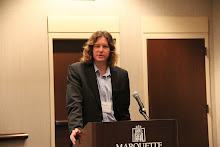This is from Beckett's "Ohio Impromptu":
"Could he not now turn back? Acknowledge his error and return to where they were once so long alone together. Alone together so much shared. No. What he had done alone could not be undone. Nothing he had ever done alone could ever be undone. By him alone."
Saturday, April 17, 2010
Subscribe to:
Post Comments (Atom)


This sounds unacceptable, like the person has given up or needs another person for a certain decisive action. 'Of course,' one wants to say, 'it's never too late to make amends, to forgive and forget or change one's course for the better.' I see the reader and listener in this beautiful play as one person not being able to escape his memories. His decisions can't be undone - they have made him what he is. And if the dear one referred to is still alive he feels incapable of approaching this person, with whom he would have to work with to ease the burden of the past. Yet for all those "profounds of thought" this little play aches with beauty.
ReplyDeleteMark, I am fascinated by the doubling in this play. There is, it seems to me, something to the idea that many things we do alone we can not undo alone. For example, there is a sense in which I can not truly re-invent myself by myself or really even move on from the past alone. It requires a relation to the Other, even if the Other ends up being a book or worldly experience. I suspect that alone, truly alone, we are sterile. What strikes me about this play is that the character has Othered himself, as it were, in order to attempt to escape from his own sterility.
ReplyDeleteIt is fascinating. You find that doubling throughout Beckett's work. 'Othering one's self' is a neat phrase; you see Beckett make his characters do that in a way, in Watt and Molloy, that also stands in for the author and his creation.
ReplyDeleteI do think we are all connected. We all make our world together.